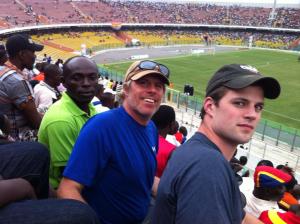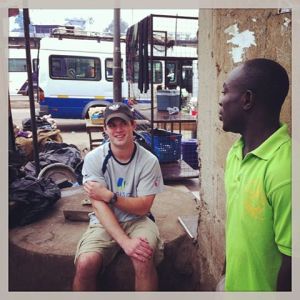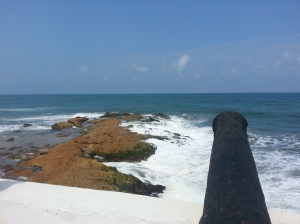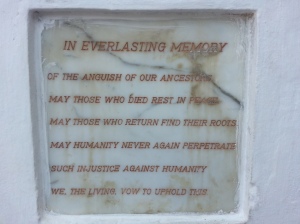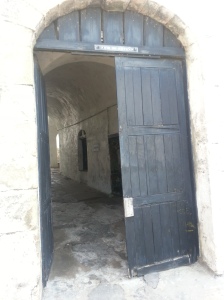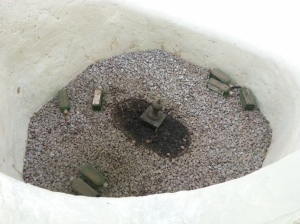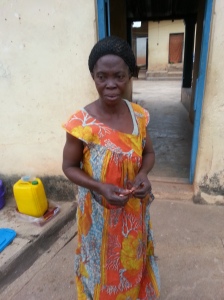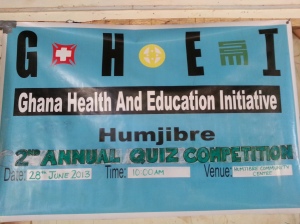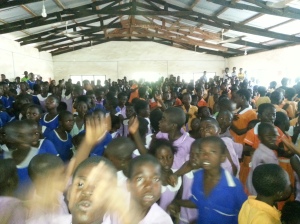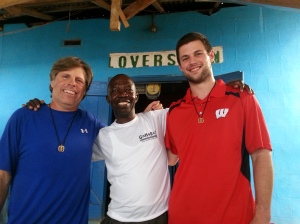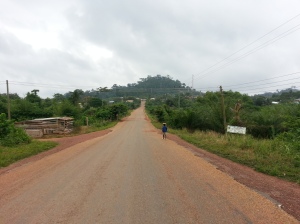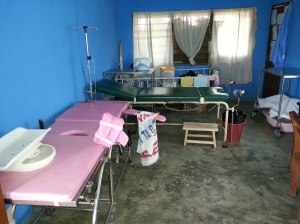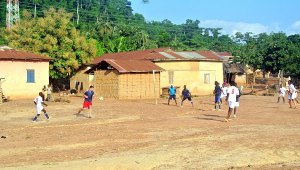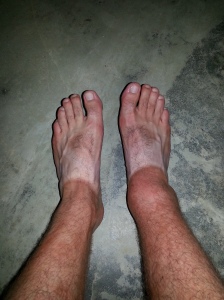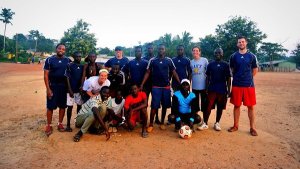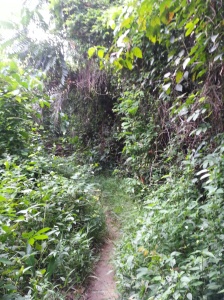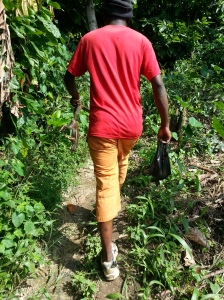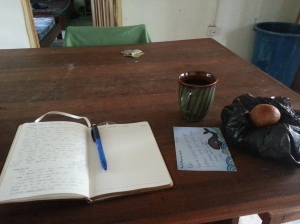I had two main purposes while in Ghana: the first was to help GHEI in any way possible and the second was to learn as much as possible. But, as someone who really wants to make a difference in the world, I knew I wanted to make a lasting difference during my short time in Ghana. I suppose even before I ever stepped foot in Ghana I had thought about how to best make a lasting difference in such a short period of time. Once I arrived in Ghana, specifically in Humjibre, I had conversations with a variety of people as to how I could best achieve this goal.
The answers I received varied. I heard that just by being there makes a difference. I heard that by working with GHEI and helping the organization achieve its goals makes a difference. I heard that by simply playing with children on a day-to-day basis makes a big enough difference because it is unlikely the children receive that attention and interaction anywhere else. I heard that my knowledge of education and different teaching strategies makes a difference. Even after doing all of the above, I still hadn’t thought that my contributions in Humjibre would be everlasting.
In fact, I still don’t think my presence in Humjibre is everlasting. However, I do know that I found my purpose in being there, in GHEI’s presence in the community, and in education. See, although I am a teacher, I was oftentimes conflicted while in Humjibre because who are we to encourage a community to learn about education and health if they can be happy without our presence? Before going to Humjibre, it was important to me that there was a local, in-country staff that was comprised of community members. I never wanted to be part of a crew of white people in a foreign land trying to sell a product, whether that product was education, religion, or lip balm.
Honestly, I’m a purpose-driven person. I need a purpose to be motivated and invested. By finding this purpose, I can continue to work towards making an everlasting difference in Humjibre and elsewhere. There was one night in particular that sticks out in my mind. This night was Wednesday, June 26 and was the night of no sleep due to a party in the community center.
Because I couldn’t sleep, I went outside to hang out and be part of the commotion. It was near the community center where I encountered a group of children hanging out socializing and laughing. The group seemed like fun so I joined gravitated towards them. There was a clear language barrier (as these kids ranged anywhere from 6-12 years old) but, as we all know, smiles are universal.
For some reason, I’ve always felt comfortable around kids of this age and I’ve oftentimes been complimented on being “good with kids”. I enjoy their youthfulness, energy and infectious behavior. I also enjoy the break they provide me from the “real world”, as most children aren’t bogged down by day-to-day life that can be, at times, overwhelming and disheartening.
On this night there was one little girl in particular who acted more energetic, carefree and genuinely happy than anyone else, including other children. I add the caveat of being “genuinely” happy because there is a saying in Ghana where the people keep “smile when suffering”. While I believe the U.S. needs to adopt this unique perspective, this little girl was as genuine and honest in her laughter and smile that a human can be. The girl’s name is Sarah.
Sarah, her friends and I played a variety of games together. Many of these little games are ones I learned from my own dad, who is far superior in playing with children than me. All of the children loved the games, and I don’t intend that to be arrogant. Anyways, per her youthful energy, Sarah seemed to enjoy the games more than most. Yes, all of the children were smiling and laughing but no one smiled or laughed quite like Sarah. The children were theatrical, as children are, when I would pat them on the head after a missed high five or softly flick them in the throat. But, none were as theatrical as Sarah.
Sarah is the type of child who is so seemingly happy in every sense of the word that it’s almost infuriating that someone can be that happy. I want to be that happy and I want everyone else to be that happy. Herein lays the purpose of GHEI, education and my work. To preserve and foster that happiness, Sarah needs to be afforded an education. Sarah (and everyone else) deserves the opportunity to not only learn, make goals and create dreams but she also needs to be given the tools to become a lifelong learner, to reach her goals and to make her dreams come true in order to live a happy and fulfilled life.
This is the true power of education. Some people have no higher inspiration in life than to work a menial, thankless, 9-5 job and there is, in my opinion, absolutely nothing wrong with that. People should be able to live their life however they see fit (given that they don’t do anything Aaron Hernandez-esque). However, people should be exposed to different options. Basically, education provides people choices. We’ve all heard of the term “educated decision”. Well, there are few things in life that are more tragic than “uneducated decisions” (and, just to clarify, there are plenty of educated people who make uneducated decisions on a daily basis, just look in the realm of politics).
If Sarah doesn’t have access to an education, she may never be able to make educated decisions, she may never be able to have goals or dreams, and, without hopes of achieving goals and dreams, what is there to live for? The last thing I want is to see all of the life, the youthful energy and infectious smile to be sucked out of Sarah by not giving her a chance to develop and chase whatever dreams she may have now or in the future. That would be a tragedy in every sense of the word.
Yes, I have mentioned that people seem happy in Ghana. Yes, I think this is due in part because of the immense poverty. And yes, I know that sounds weird. However, consider this: Thoreau, in Walden, advises us to “simplify, simplify” and to “cultivate poverty”. It’s a pretty easy concept if you think about it. I’m going to steal this analogy from a movie (Up in the Air) but…imagine you have a backpack. First, you fill it with the smaller items in your life, whether it’s your phone, laptop, books, whatever. Next, you fill it with the slightly larger items you have: your chairs, desks, tables, etc. Then, you fill it with the largest items you have: your car, your house, your boat, etc. That backpack gets very heavy vary fast.
This is the life most of us lead; one that says we are “free” but we are really not. Rousseu opens his Social Contract by stating, “Man is born free; and everywhere he is in chains.” These societal chains are put on by the government, our jobs, our families, but mostly we put them on ourselves. It becomes pretty obvious that to be truly free, you have to shed your attachments. In other words, simplify and cultivate poverty. Less is truly more.
However, my purpose isn’t to cultivate poverty. My true value isn’t to convince others to cultivate poverty. Yes, I see value in cultivating poverty. Yes, I see value in changing our perspective to “smile when suffering”. However, the true value in life is in education. I believe that humans are inherently and naturally “good”. If we can give people the necessary tools to make educated decisions, I believe our society and world will become a better place. Simply put, we need to let people, like Sarah, have the opportunity to obtain a quality education.
This is GHEI’s purpose and this is my purpose. I want to help all people obtain access to a quality education. Education is the one thing in life that can help all people achieve their dreams and goals. True, sports do that for some. True, music does that for others. There are other avenues to achieve your dreams. But for the overwhelming majority of people, education is a necessity in order to achieve dreams. With an education, you have hope. Without hope, what is there to live for?
Remember: It doesn’t always matter what dreams you chase in life, what matters is that you have the chance to dream.
To learn more about GHEI, please see the following and, if possible, consider donating:
Website: ghei.org
Blog: http://gheinews.blogspot.com/
Twitter: https://twitter.com/GhanaGHEI
Facebook: https://www.facebook.com/GHEI.Ghana





